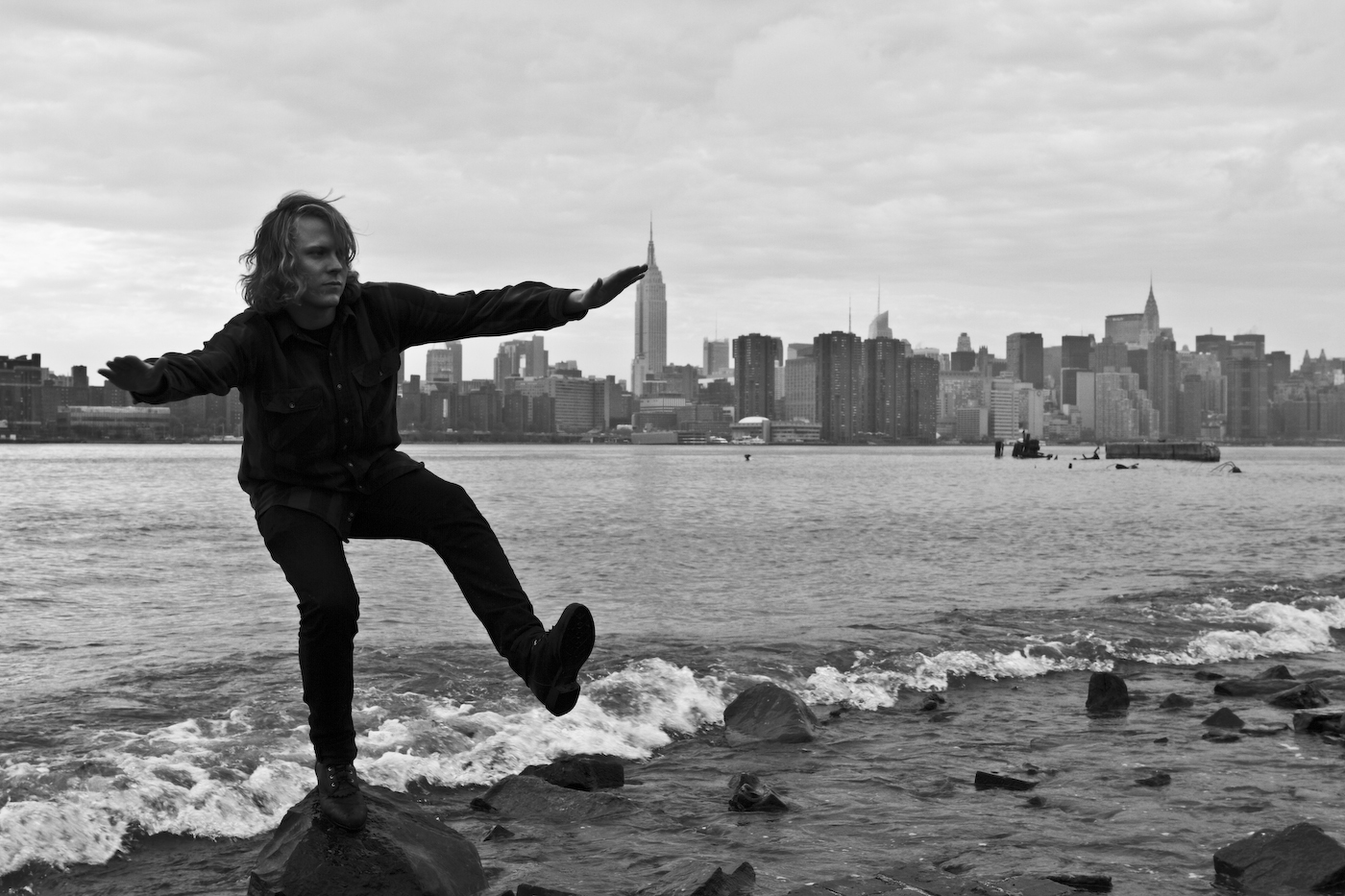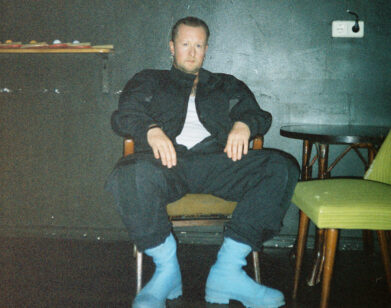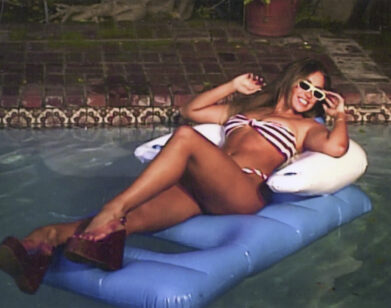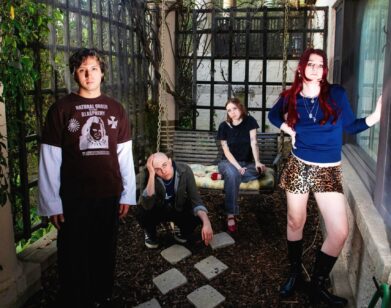Ty Segall’s Corrected View of California

TY SEGALL. PHOTO BY MATT CREED
There is no disputing Ty Segall’s California bona fides. A child of the ’90s and ’00s living in Laguna Beach, he surfed daily, skated almost as often if less proficiently, worshipped southern California music legends Black Flag and Redd Kross, and even had his own well regarded high school punk outfit, Epsilons. That life had little to do with the “Laguna Beach” that was prettied and blonded up for mass consumption by a certain reality show, and in fact Epsilons did a genius send-up of that show that can still be found online. When it came time for college, Segall headed north to the city by the bay, a music mecca of a different sort. San Francisco injected some psych into his garage-punk sound, and led to a meeting with local art punk legend John Dwyer of Thee Oh Sees, who released Segall’s self-titled 2008 solo LP (after stints with The Traditional Fools, The Perverts and more) on Dwyer’s Castle Face Records.
Segall is Golden State through and through—so when he says that his latest release Goodbye Bread is his response to the spate of beachy, west coast-centric music that’s been populating the indie-rock landscape of late, he’s speaking with some authority on the subject. Songs like “California Commercial,” “I Can’t Feel It,” and “You Make The Sun Fry” marry skeptical and knowing lyrics with sunny vocals, ambling, sun-baked wooze, Brit-pop, and a cleaner sound than defined Segall’s last couple of albums, 2009’s Lemons and last year’s excellent Melted, both released on Memphis stalwart Goner Records.
If the new album, which arrives on Chicago indie Drag City, is still “lo-fi” to some ears, it’s all relative. Goodbye Bread has some of Segall’s most accomplished songwriting to date, and the OC/SF legend has done both southern and northern California proud. We talked sonics, geographics and more with Ty Segall at Williamsburg, Brooklyn’s legendary KCDC skate shop, where he was set to play a one-man promo show, without his usual band.
JOHN NORRIS: Ty! I haven’t seen you since the infamous “Bruise Cruise” in February. And this new album was actually done before that?
TY SEGALL: Yeah, we finished it in like December, early January.
NORRIS: And you’re playing some of the new songs today at the skate shop?
SEGALL: Just a couple. Gonna be playing one-man style, so I can’t do a lot of them.
NORRIS: And you’ve been doing the one-man performance for a while now. The band is with you a lot now, but you’re plenty capable of soldiering on yourself.
SEGALL: Sort of. I’m a little rusty. I actually now want to do the one-man thing as little as possible, because it’s more fun to play with everybody else.
NORRIS: Anyone who knows anything about you knows you have been surfing since you were a kid. Were you a pretty accomplished skater as well?
SEGALL: I tried. I was one of those guys that would use it as transportation, but if I tried to do anything fancy, I would severely hurt myself.
NORRIS: Since I saw you in February, there’s been an EP, the Ty Rex covers release, and then your last album Melted was out just over a year ago in April. I think that’s great, but are you ever concerned about putting out too much, too often?
SEGALL: Oversaturation. If you’d have asked me two years ago, I’d have been like “No, anything and everything. Go for it.” Now, I want to focus on doing the best I can each time. But I think it’s hard for me to only put out one record a year. Because I get too antsy. But it’s good I’m learning to do that, because each record counts. And you should make it count.
NORRIS: So the new album Goodbye Bread—are they all songs written fairly recently, since Melted?
SEGALL: Yeah, they’re all new songs, songs that kind of developed around this idea of California. And how the whole “beach” thing kind of came up again in music. I interpret it differently, maybe because I’m from California. And so kind of the idea of the record was the California apathy, or listlessness. With this pretty scenery around, but it’s also dark and depressing in a way, while it’s beautiful. That kind of theme. So that intrigued me, because it’s not all just smoking weed and skateboarding and palm trees.
NORRIS: And hanging out at the beach?
SEGALL: Yeah, well, you can be at the beach and be really sad.
NORRIS: So… this sounds like it might be a response to the Best Coasts and Wavves of the world?
SEGALL: Oh no no, I wanna stay clear of that kind of stuff.
NORRIS: Well, they’re hardly the only ones. Beach House, Beach Fossils, people all over have been getting beachy lately.
SEGALL: “Beach.” It’s a very loose term now. Pretty widely used term. And that’s awesome, but I guess my California experience is different from a lot of people’s interpretations, and I think maybe I just wanted to put my spin on it.
NORRIS: And there’s a song on the record, “California Commercial,” that kind of speaks directly to that, right?
SEGALL: Yeah, maybe that song is just my response. I mean, I’m from Laguna Beach, you know? And that was a reality show that completely destroyed my hometown. I’m kind of a bitter person about it to be honest.
NORRIS: Did that show kind of blow up while you were in high school?
SEGALL: I had just graduated. So I had a very interesting first two years of college. So basically that’s my response to this reality-TV beach idea. Blond hair. It’s more of a joke, really, but it’s a little serious too.
NORRIS: Well, these days you are as much SF as LA. You moved up north after high school. Any reason why San Francisco, since you didn’t know anyone up there?
SEGALL: No, I didn’t, I moved up by myself. I think that might have been part of the draw, for me. I thought about moving to LA. I really loved [LA all-ages club] The Smell. I loved that scene; I really wanted to be involved with that. But I decided I needed to move away from where I was from, just far enough that I could really be on my own and really figure myself out. And then so I went to San Francisco and thought, “This is amazing, I’ve got to live here.”
NORRIS: How did the reality of San Francisco compare to maybe the myth that a lot of us have? These days, I don’t think it’s as much of a real music destination, because a lot of people think of it as this super-expensive jewel box of a city.
SEGALL: It is very expensive. But I do believe in this stuff and there is a force, a magical kind of thing there. That feeling of like, I’ve never been to another place like it. It doesn’t even feel Californian. Even how it’s laid out physically, it’s very strange. Like, the weather patterns don’t make sense. They do scientifically, but in a practical way it doesn’t make any sense. And that weirdness, it really creates some weird thing in the air. But it is you know, on a practical level, it’s very expensive, and it’s a very business-oriented place, too, and there’s a lot of that stuff going on.
NORRIS: That’s my experience, those areas that people visit that have a lot of mythology connected to them—the Haight or Castro or the Mission—people visit them, but to an extent, it’s like they’re trapped in time. They’ve got their identities, but then a lot of the rest of it is yuppie-dominated.
SEGALL: It’s a modern city, but the Haight is still the Haight. And Golden Gate Park is still insane to walk through, and Ocean Beach, these are magical places.
NORRIS: How do you think it’s affected you, in terms of what you create?
SEGALL: It’s weird to admit this, but I really wasn’t into psychedelic music before I went there. And know that’s like the expected thing, or something, but I literally bought my first 13th Floor Elevators record like a month after moving there. It’s funny to admit that, but it was like, “Oh, what’s this? This is great?!” And then, “Red Krayola—this is awesome,” and it went from there. It really affected me.
NORRIS: Is it valid to say you may be heading in something more of a psychedelic direction? Or who knows?
SEGALL: I really like to think of each record as its own thing. So, for sure, but I hate the idea of being stuck in anything. Like I want to do a Hawkwind-style record too, or a noise rock record or a hardcore record. Why not, you know? I would just not want to keep heading too far in one direction, without pulling off and going the other way. That is what is fun for me.
NORRIS: Your vocals are more prominent this time.
SEGALL: To be honest, I was just happier with the lyrics this time. It’s my own little statement. It may not be that heavy or weighty, but it’s real and it’s honest. It feels cool to be like, “Yeah, let’s turn the vocals up,” because I actually like what I am saying, as opposed to, “Oh, it’s a party song, it doesn’t matter.”
NORRIS: That album title—Goodbye Bread—seems to suggest that you’ve come to realize that a super lucrative career path is not necessarily the one you have chosen. Is that the idea?
SEGALL: There’s a couple meanings for it but that’s one of them, for sure.
NORRIS: You’re happy, though, I hope? Out on the road this summer, you guys are playing the Outside Lands Festival in San Francisco.
SEGALL: Oh yeah, it’s pretty crazy. To be playing with Arcade Fire? We’re just some snot-nosed kids, man.
TY SEGALL’S GOODBYE BREAD IS OUT JUNE 21 ON DRAG CITY. HE WILL TOUR THE US AND CANADA THROUGHOUT THE SUMMER. FOR MORE ON SEGALL, VISIT HIS MYSPACE.






